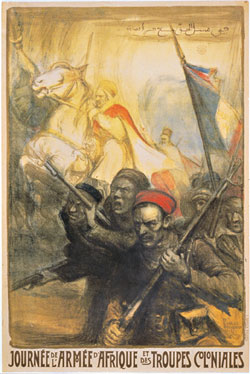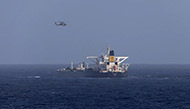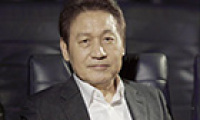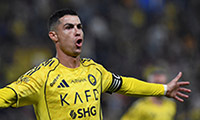French Colonial Past Casts a Long Shadow

France and Africa have complex ties. A poster of colonial troops.
French troops and helicopters were vital in bringing the drama in Ivory Coast to a close, striking the heavy weapons and presidential palace of the defeated presidential candidate Laurent Gbagbo and making possible his arrest. And France is the country that has pushed hardest for intervention in Libya on behalf of the opposition to Colonel Muammar el-Qaddafi.
But Mr. Sarkozy and the Foreign Ministry reject the suggestion of a return to colonial reflexes, emphasizing that in both cases France acted under a mandate from the United Nations Security Council that authorized the use of force to protect civilians. French officials also point out that Libya was an Italian colony ; that French troops did not arrest Mr. Gbagbo; and that Paris was slow to understand the depth of the anger in its former protectorate, Tunisia.
Mr. Sarkozy’s line for Africa is “neither interference nor indifference.”
France’s empire covered much of North and West Africa, from Algeria to Ivory Coast. The colonies were granted independence in the 1960s, but France still has troops based in Africa and close business, political, linguistic and personal ties to its former colonies, which give France more importance in the world.
Accusations persist of France taking sides to make new presidents
or overthrow old ones, of illegal political contributions and payoffs, of parallel but separate policies run by the president and the Foreign Office. The newspapers, for instance, have depicted the friendship of Mr. Sarkozy’s former wife, Cecilia, with the French wife of Gbagbo rival Alassane Ouattara, and Mr. Gbagbo played on anti- French sentiment in his effort to retain power.
The French newspaper Liberation said of Ivory Coast that “even if wrapped in a U.N. resolution and supported by countries in the region, this French mission resembles the interventions of the past and risks being seen as such by young Africans.”
Fifty years after African independence, the paper said, France has “found itself anew on the front line in a continent to which Nicolas Sarkozy promised a ‘renewed’ relationship, the end of old privileges and a military disengagement.”
Achille Mbembe, a Cameroonianborn historian and critic of French involvement in Ivory Coast, said that France continued to support African dictators, mentioning the leaders of Gabon, Cameroon, Congo, Chad and Togo. He saw “a continuity in the management of Francafrique - this system of reciprocal corruption, which, since the end of colonial occupation, ties France to its African henchmen.”
Albert Bourgi, a professor of law , wrote in Le Monde that Ivory Coast “reawakens the memory, sometimes damning, of numerous excesses of French African policy .”
But other analysts suggest that Mr. Sarkozy was sincere when he said that his African policy would emphasize partnership and not paternalism, and note that he does not share the same ties to Africa as his predecessors.
“Sarkozy has no nostalgia for the former colonies, and I believe there has not been any real change in his African policy,” said Antoine Glaser, former editor in chief of Lettre du Continent, an African newsletter, and co-author of “Sarko in Africa” and “How France Lost Africa.”
In a way, Mr. Glaser said, Mr. Sarkozy was “trapped” in Ivory Coast, with French troops protecting thousands of French citizens in Abidjan and being asked by the United Nations to end the Gbagbo standoff .
“But with the presence of the French troops, even under a U.N. mandate, there’s always the phantasmagoria of Francafrique, all the colonial past. France has not yet been able to turn the page completely.”
Stephen W. Smith, former Africa editor of Le Monde and co-author with Mr. Glaser , said that France was not returning to the period of Francafrique, which largely ended in the mid-1990s. “Sarkozy is not interested in Africa, but sees it as more of a nuisance than an asset,” Mr. Smith said. Africa is important for energy and France’s self-image, he said, but French presence and influence in its former colonies are much reduced with generational and political change.
Today, France has little corporate involvement in the main economic pillars of Ivory Coast, cocoa, coffee and oil, Mr. Smith said. In the 1980s, there were 50,000 French expatriates in Ivory Coast; now the number is 12,000, of whom at least 7,000 are dual nationals.
France is visible in construction, electricity and telecommunications, but has bigger investments in non-Francophone Africa. Still, French businessmen are investing all over Africa, and many feel a tie to a former empire.
But the special French mix of accusation and guilt over African colonialism is a kind of relic, Mr. Smith said.
“In the period of Francafrique, there were very few dissident voices in France,” he said.
“There is a kind of rediscovery, a soul-searching exercise that is also an exercise in identity. Many French don’t look at Africa as it is, but at themselves, as a mirror effect, mostly as a villain, but sometimes as a help.”
But as Mr. Glaser said, “So long as France has soldiers deployed on African soil, the ambiguity will last.”
STEVEN ERLANGER
ESSAY
스마터리빙
more [ 건강]
[ 건강]이제 혈관 건강도 챙기자!
[현대해운]우리 눈에 보이지 않기 때문에 혈관 건강을 챙기는 것은 결코 쉽지 않은데요. 여러분은 혈관 건강을 유지하기 위해 어떤 노력을 하시나요?
 [ 건강]
[ 건강]내 몸이 건강해지는 과일궁합
 [ 라이프]
[ 라이프]벌레야 물럿거라! 천연 해충제 만들기
 [ 건강]
[ 건강]혈압 낮추는데 좋은 식품
[현대해운]혈관 건강은 주로 노화가 진행되면서 지켜야 할 문제라고 인식되어 왔습니다. 최근 생활 패턴과 식생활의 변화로 혈관의 노화 진행이 빨라지고
사람·사람들
more
[인터뷰-문경환 한인회장] “캔자스, 이민자들에 제2의 기회의 땅”
“캔자스시티는 삶의 속도와 기회의 균형이 잘 맞는 도시입니다. 제2의 인생을 시작하기에 더없이 좋은 곳이죠.”29일 본보를 방문한 문경환(61…

일사회 창립 14주년 기념식 및 송년행사
전·현직 민주평통자문위원들의 모임인 일사회(회장 박철웅)는 지난 16일 용수산에서 창립 14주년 기념식 및 송년회를 개최했다. 이날 행사에는 …
LA평통 통일전략분과 상견례
LA 평통(회장 장병우) 통일전략분과(위원장 이정현)는 지난 27일 형제갈비에서 상견례 겸 간담회를 개최했다. 이날 모임에서는 위원 간 교류를…
새해 ‘사랑의 쌀’ 나눔 내달 10일 교협 강당
남가주기독교교회협의회(회장 김재율 목사·이하 교협)가 새해를 맞아 ‘새해 오찬기도회 및 사랑의 쌀 나눔’ 행사를 개최한다. 행사는 오는 1월1…
[송년 행사] 이승만 기념사업회
이승만 건국대통령 기념사업회(회장 박요한)가 지난 18일 시티 뱅큇 홀에서 송년회를 개최했다. 이날 행사에서는 장혜숙, 장준구, 이형숙, 이하…
많이 본 기사
- 트럼프 만나고온 젤렌스키 “우크라에 미군 주둔 방안 논의중”
- 소프트뱅크, 오픈AI에 410억달러 투자 완료…11% 지분 확보
- 이란, 트럼프-네타냐후 회담 직후 “당신들은 우리 못 꺾소”
- 폭설 속 산행 비극… 마운트 볼디서 3명 조난 사망
- 새해 미국 건국 250주년… ‘트럼피즘’ 도전장 받은 민주공화정
- 한국팀 뛸 곳인데… 강력범죄 ‘충격’
- 가주 판매 간 소고기 ‘이콜라이’ 오염
- 디즈니 ‘유튜브에 아동정보 무단제공’ 1천만 달러 과징금 확정
- ‘아듀~ 2025!’… 희망찬 새해로
- LA 북쪽 테혼 카지노서 하룻새 10만불 ‘연속 잭팟’
- [알림] 오늘 신년특집 발행
- “10년간 모든 이민 전면 금지?” 황당 주장
- ‘백두산 호랑이’ 대가족 포착… “매우 희귀한 일”
- [연말 화제] 올해도 찾아온 ‘얼굴 없는 천사’
- [LA 일원 새해맞이 명소는] “웰컴 2026”… 남가주 새해맞이 행사 풍성
- 동포청 ‘재외동포 이해교육’ 실시
- [인터뷰-문경환 한인회장] “캔자스, 이민자들에 제2의 기회의 땅”
- 구리선 절도범 소행에 LA 교통 통신망 ‘먹통’
- [연말 기획] 한국계 혼혈들 두각… 각 분야에서 ‘맹활약’
- ‘케네디’가 또 비극 외손녀 희귀암 별세
- 신년 연휴 폭풍우… 비 3인치 온다
- 트럼프 “베네수엘라 마약 싣는 항만 타격”… 첫 지상 공격
- [경제 트렌드] AI 열풍 속에 신흥 2030 억만장자 급증
- 우크라 ‘푸틴 관저 공격설’에 종전 기대감 찬물
- “치매에 치즈가 좋대서 맨날 먹었는데”… 고지방 주의
- [한인 은행장 신년사 통해 본 비전과 경영 목표] “끊임없는 변화와 혁신으로 안정적 성장 도모”
- 케이스쉴러 주택가격지수 상승
- 원·달러 환율… 연평균 기준 ‘역대최고’ 마감
- 기아, 타임스퀘어 새해 전야 참여
- 인디브랜드가 이끈 K뷰티… 패션도 유럽 본고장 깃발
- 목표는 1,000골… 불혹 호날두 “부상 없다면 가능”
- ‘헤비급 복서’ 조슈아 구사일생 동승자 2명 사망사고에도 경상
- 오픈AI에 400억불 투자 소프트뱅크가 10% 지분
- 연방정부, 기업 채용·승진정책 조사
- 단백질 늘리고 탄수화물 줄이고…영양소 적정 기준 개정
- 이강인 뛰는 PSG, ‘2025 최고의 팀’
- 샴페인, 마지막 날과 첫날을 위하여
- SI “김하성 영입은 A-” 수비력 유지·공격력 향상
- 트럼프 이름 덧붙인 ‘케네디센터’ 공연 줄취소
- 요키치 부상… 덴버, 마이애미에 덜미
- [조지 F. 윌 칼럼] 저무는 2025년에 안도의 한숨
- “경기 둔화·샤핑패턴 변화 파고 못 넘어”
- [만화경] 경영자의 ‘문제적’ 사과
- 사실상 고객 1인당 1만원… “생색내기 보상으로 불신만 키워”
- SNS, 뉴스 매체로도 인기 틱톡·유튜브·페이스북 등
- [수요 에세이] 다시, 제자리로 돌아와서
- 삼성·SK 중 반도체공장 장비규제 완화
- 정부 “KT 침해사고 과실 인정… 위약금 면제해야”
- 메타, ‘제2의 딥시크’ 마누스 인수
- 중국, 올해 신차판매 1위… 일본 ‘20년 아성’ 깼다
1/5지식톡

-
 미 육군 사관학교 West Poin…
0
미 육군 사관학교 West Poin…
0https://youtu.be/SxD8cEhNV6Q연락처:wpkapca@gmail.comJohn Choi: 714-716-6414West Point 합격증을 받으셨나요?미 육군사관학교 West Point 학부모 모…
-
 ☝️해외에서도 가능한 한국어 선생님…
0
☝️해외에서도 가능한 한국어 선생님…
0이 영상 하나면 충분합니다!♥️상담신청문의♥️☝️ 문의 폭주로 '선착순 상담'만 진행합니다.☎️ : 02-6213-9094✨카카오톡ID : @GOODEDU77 (@골뱅이 꼭 붙여주셔야합니다…
-
 테슬라 자동차 시트커버 장착
0
테슬라 자동차 시트커버 장착
0테슬라 시트커버, 사놓고 아직 못 씌우셨죠?장착이 생각보다 쉽지 않습니다.20년 경력 전문가에게 맡기세요 — 깔끔하고 딱 맞게 장착해드립니다!장착비용:앞좌석: $40뒷좌석: $60앞·뒷좌석 …
-
 식당용 부탄가스
0
식당용 부탄가스
0식당용 부탄가스 홀세일 합니다 로스앤젤레스 다운타운 픽업 가능 안녕 하세요?강아지 & 고양이 모든 애완동물 / 반려동물 식품 & 모든 애완동물/반려동물 관련 제품들 전문적으로 홀세일/취급하는 회사 입니다 100% …
-
 ACSL 국제 컴퓨터 과학 대회, …
0
ACSL 국제 컴퓨터 과학 대회, …
0웹사이트 : www.eduspot.co.kr 카카오톡 상담하기 : https://pf.kakao.com/_BEQWxb블로그 : https://blog.naver.com/eduspotmain안녕하세요, 에듀스팟입니다…
케이타운 1번가
오피니언
 정숙희 논설위원
정숙희 논설위원샴페인, 마지막 날과 첫날을 위하여
 조지 F·윌 워싱턴포스트 칼럼니스트
조지 F·윌 워싱턴포스트 칼럼니스트 [조지 F. 윌 칼럼] 저무는 2025년에 안도의 한숨
 김동찬 시민참여센터 대표
김동찬 시민참여센터 대표 [미국은 지금] 책임 있는 자본 없으면 커뮤니티 미래도 없다
 성영라 수필가 미주문협 부이사장
성영라 수필가 미주문협 부이사장 [수요 에세이] 다시, 제자리로 돌아와서
 신경립 / 서울경제 논설위원
신경립 / 서울경제 논설위원 [만화경] 경영자의 ‘문제적’ 사과
 문태기 OC지국장
문태기 OC지국장 한인 정치력 업그레이드 기대
 민경훈 논설위원
민경훈 논설위원세계 역사를 바꾼 동물
 박홍용 경제부 차장
박홍용 경제부 차장 한인사회가 주목해야 할 새해 경제
 박영실 시인·수필가
박영실 시인·수필가 [화요칼럼] 피드백
1/3지사별 뉴스

메트로카드, 31년만에 역사 속으로
1994년 처음 등장해 지난 31년간 뉴욕시 전철과 버스 승차권으로 쓰인 메트로카드가 31일을 끝으로 역사 속으로 사라진다. 더 이상 메트로카…
■ 사고- 한동대·뉴욕한인청소년센터 국제여름캠프

2025 워싱턴지역 10대 뉴스
다사다난했던 2025년이 하루만 남겨둔 채 역사의 저편으로 저물고 있다. 올해의 가장 큰 뉴스는 트럼프 2기 행정부 출범과 함께 몰아친 이민 …
내년 1월부터 달라지는 MD 법안들

셀폰 위치추적, 납치된 딸 살렸다… ‘부모 통제’ 기능 활용
스마트폰에서 자녀의 위치를 확인할 수 있는 ‘부모 통제(parent control)’ 위치 추적 기능의 도움으로 납치됐던 청소년들이 잇달아 구…
[새해부터 이렇게 달라진다] 최저임금 또 오르고… 유급 병가는 더 확대

오늘 하루 이 창 열지 않음 닫기 


















































.png)


댓글 안에 당신의 성숙함도 담아 주세요.
'오늘의 한마디'는 기사에 대하여 자신의 생각을 말하고 남의 생각을 들으며 서로 다양한 의견을 나누는 공간입니다. 그러나 간혹 불건전한 내용을 올리시는 분들이 계셔서 건전한 인터넷문화 정착을 위해 아래와 같은 운영원칙을 적용합니다.
자체 모니터링을 통해 아래에 해당하는 내용이 포함된 댓글이 발견되면 예고없이 삭제 조치를 하겠습니다.
불건전한 댓글을 올리거나, 이름에 비속어 및 상대방의 불쾌감을 주는 단어를 사용, 유명인 또는 특정 일반인을 사칭하는 경우 이용에 대한 차단 제재를 받을 수 있습니다. 차단될 경우, 일주일간 댓글을 달수 없게 됩니다.
명예훼손, 개인정보 유출, 욕설 등 법률에 위반되는 댓글은 관계 법령에 의거 민형사상 처벌을 받을 수 있으니 이용에 주의를 부탁드립니다.
Close
x